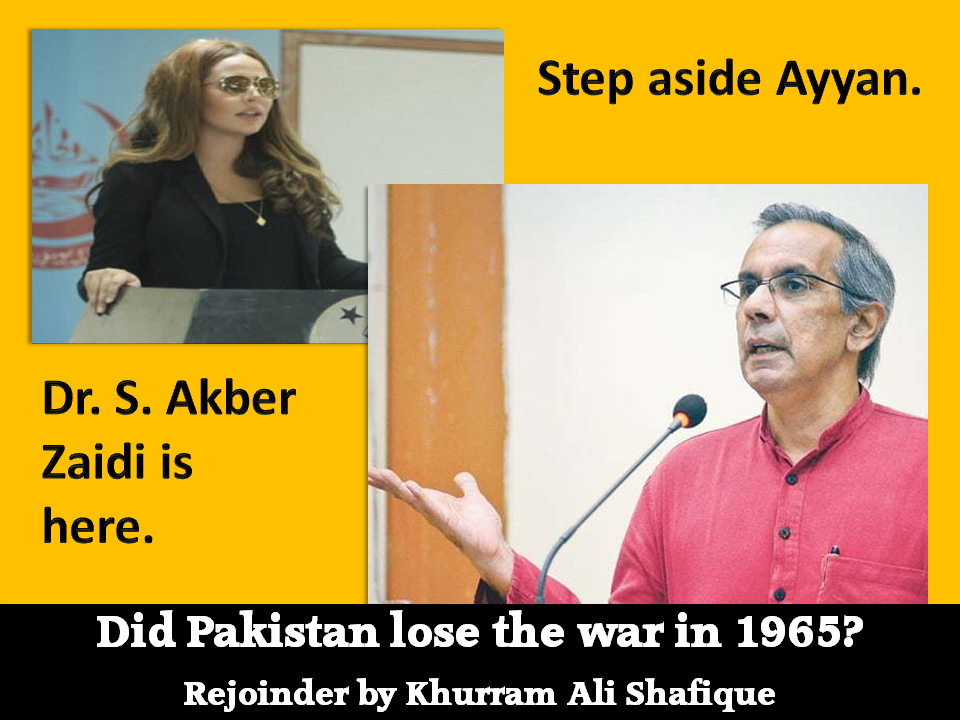Just a day before the commencement of the Golden Jubilee celebrations of the 1965 War, a headline was circulated in the Pakistani media that the country did not win the war but lost it. The line appeared in the press report of a lecture by Dr. S. Akbar Zaidi delivered in the University of Karachi – the institution which had recently come under criticism for hosting a lecture by the controversial celebrity Ayyan Ali.
It seems that Dr. Zaidi made the statement while answering a question, otherwise the crux of his lecture was that “students are not taught the history of the people of Pakistan rather it is focused on the making of Pakistan.”
For both these statements, Dr. Zaidi has been applauded in the some of the comments posted on the website of the Dawn newspaper. “Hats off to the gentleman,” writes one reader, “it takes courage to speak the truth. With information getting digitized, the younger generation will develop deeper understanding then their predecessors.”
I only wish that this were true. In Pakistan, a very large number of intellectuals, fashion models, terrorists, suicide attackers, Marxists and liberals have long been saying things quite similar to what Dr. Zaidi has said now. Yet the younger generation does not seem to be getting any wiser. Quite the contrary. The youth today are more confused about their identity than ever before.
Why is it so? In my humble opinion, it is because we do not understand the true meaning of enlightenment.
Enlightened thought really means that in discussing an issue, we present not only our own point of view but we also make an honest effort to present the opposite party’s point of view as powerfully as they themselves would have done. Then we refute them by presenting our argument.
What goes around in Pakistan by the name of enlightenment and liberalism is neither enlightened nor liberal. In truth it is bigoted thinking of the worst kind but it appears honest only because it projects the prejudices of other nations against us, rather than our prejudice against them.
In the case of Dr. Zaidi, the statements attributed to Dr. Zaidi by the newspaper are neither sound nor they are becoming of a scholar of his standing.
The consensus of academic wisdom is that the Indo-Pakistan War of 1965 was a stalemate. This leaves enough room for multiple interpretations. Hence, historians have several opinions. To oversimplify this into a definitive statement like “we lost” cannot be called a scholarly stance.
To anybody who is interested, I recommend the articles written by Major Amin. I do not agree completely with all the points of view presented there but the writer has attempted to present useful information in a balanced manner without resorting to sensationalism.
I am disappointed by the main complaint of Dr. Zaidi that the teaching of history in Pakistan focuses on the making of Pakistan and not on the people of Pakistan. The way his thesis has been presented in the news report, it seems that he failed to inform his audience that according to the founders of Pakistan, the making of the country was also an act of the general will of the people. From this point of view, a focus on the making of Pakistan is also a focus on the people of Pakistan.
Now, I understand that Dr. Zaidi does not agree with this point of view. It is his right to disagree. But he should at least show his moral superiority over those whom he is demeaning as the perpetrators of indoctrination. He could have done that by presenting his argument in an enlightened manner.
In an enlightened argument, someone holding the view attributed to Dr. Zaidi would first inform the audience about the position of the founding parents of Pakistan on this issue. Then the speaker could say that the teaching of history is not doing justice to that point of view because it does not present the making of Pakistan as an act of the free will of the people. Actually, this is what I believe, personally.
Alternatively, the speaker could have said that the founding parents of Pakistan were wrong, and the making of Pakistan had nothing to do with the people of Pakistan.
The news report gives us to understand that instead of taking the enlightened approach, Dr. Zaidi tried to fight indoctrination with indoctrination. If this is indeed the case, we should understand that in Pakistan the present chaos and confusion is because some people are fighting pro-Pakistan indoctrination with anti-Pakistan indoctrination and true enlightened thought has become either very rare or has vanished completely.

Dr zaidi`s myth may not be wrong in statistics of the battle but its true that india people and armed forces had realised (although being the many times more powerful) that they could not win the war till the last bullet and the last street boy still alive,tashkent agreement clearly shows that India was tired of the war because, 1. the PM bahadur lal sign the agreement without hesitation (gen Ayub did so also but you can say it was fair for him bcz he had lost half of his power but why indian PM?? ). 2. he didn’t demand anything (as the winning nations do). 2. and just after signing the agreement he died of heart attack there in tashkent(shows how grief fully he signed and how much he was under stress). and the war winner is, who stand conscious till the last moment and doesn’t lose HEART
Dear Khurram Sir,
Thank you for this article. It is powerful.
The intelligentsia will seek to indoctrinate the population. Thank goodness for a rejoinder like this!
It’s with an article like that – which propose to balance the views, and introduce a method of seeking truth – that truth can be found.
All good wishes,
robert